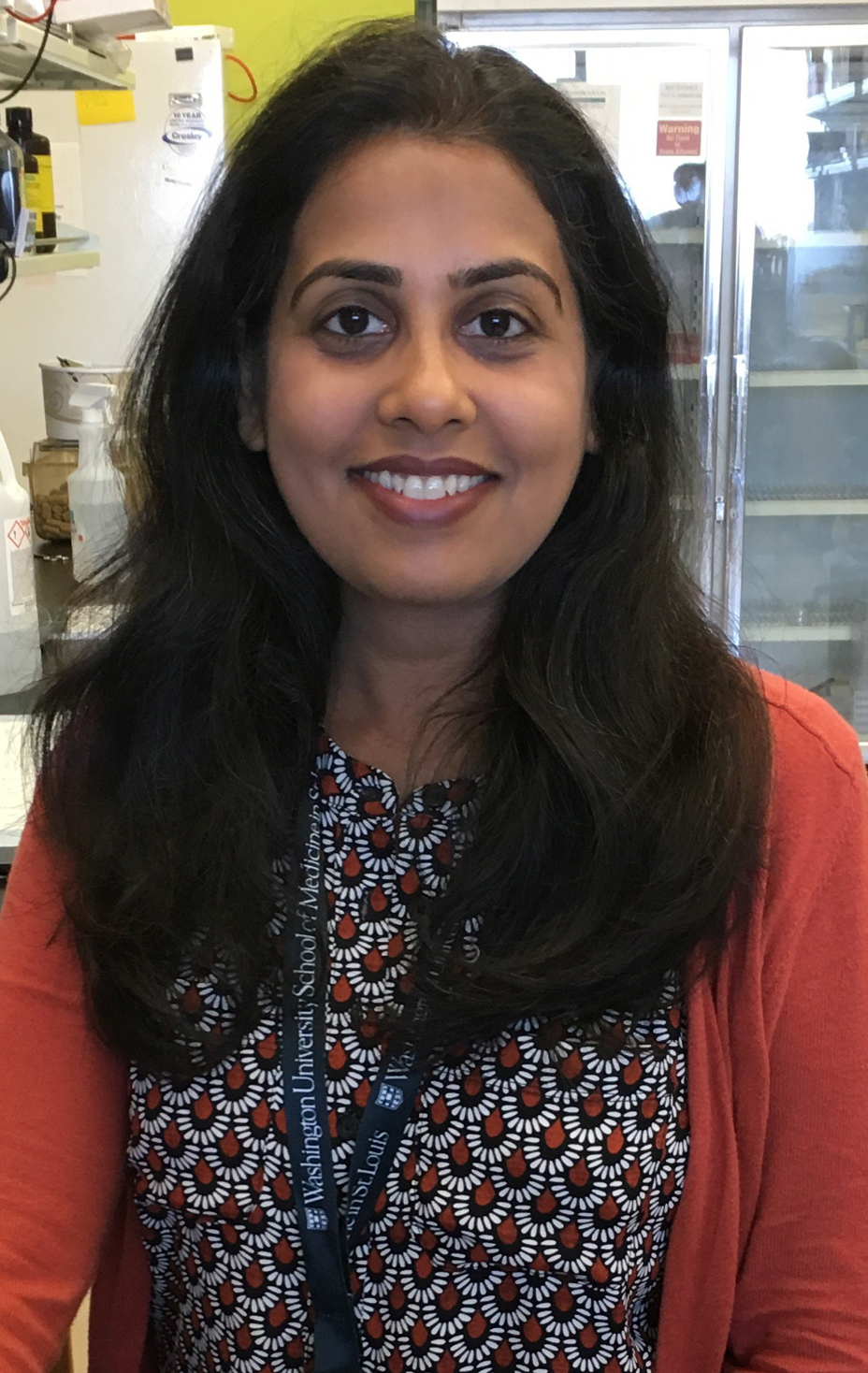
Nidhi Rohatgi, PhD
Assistant Professor, Pathology & Immunology
- Phone: 314-454-5085
- Email: nidhirohatgi@nospam.wustl.edu
Division
- Anatomic & Molecular Pathology
Education
- BS: Delhi University, New Delhi, India
- Masters, Biotechnology: Hamdard University, New Delhi, India
- PhD, Biochemistry: All India Institute of Medical Sciences, New Delhi, India
Recognition
- ASBMR Young Investigator Award, American Society for Bone and Mineral Research, 2014
- Travel Award, Musculoskeletal Research Symposium, Washington University-School of Medicine, 2016
- Best Investigator Award, American Society for Bone and Mineral Research, 2016
- Travel Award, American Society for Bone and Mineral Research, 2017
- Investigator Award, Musculoskeletal Research Symposium, Washington University-School of Medicine, 2019
- Travel Award, American Society for Bone and Mineral Research, 2021
- Travel Award, American Society for Bone and Mineral Research, 2023
- Mid-Career Faculty Travel Grant, American Society for Bone and Mineral Research, 2024
Research Interests
My research aims to exploring how cellular immune-metabolism regulates obesity and skeletal health. Specifically investigating how chromatin modifications influence the metabolic state of macrophages to adopt a homeostatic or inflammatory role in various diseases, including obesity and inflammatory arthritis. By integrating metabolomics and genomics, my work seeks to elucidate how the epigenetic-metabolic axis regulates macrophage inflammatory functions. This research will provide new insights into how macrophage metabolic states are controlled and could lead to the identification of effective therapeutic targets for inflammatory diseases.
Selected Publications
| Rohatgi N, Kaur J, Srivastava A, Ralhan R. Smokeless tobacco (khaini) extracts modulate gene expression in epithelial cell culture from an oral hyperplasia. Oral Oncol. 2005 Sep;41(8):806-20. PMID: 15979382 |
| Rohatgi N, Matta A, Kaur J, Srivastava A, Ralhan R. Novel molecular targets of smokeless tobacco (khaini) in cell culture from oral hyperplasia. Toxicology. 2006 Jul 5;224(1-2):1-13. PMID: 16730401 |
| Rohatgi N, Remedi MS, Kwon G, Pappan KL, Marshall CA, McDaniel ML. Therapeutic Strategies to Increase Human β-Cell Growth and Proliferation by Regulating mTOR and GSK-3/β-Catenin Pathways. Open Endocrinol J. 4: 2010. PMID: 24339841 |
| Rohatgi N, Aly H, Marshall CA, McDonald WG, Kletzien RF, Colca JR, McDanielML. Novel insulin sensitizer modulates nutrient sensing pathways and maintains β-cell phenotype in human islets. PLoS One. May 1; 8(5), 2013: e62012. PMID: 23650507 |
| Izawa T *, Rohatgi N*, Fukunaga T, Wang QT, Silva MJ, Gardner MJ, McDaniel ML, Abumrad NA, Semenkovich CF, Teitelbaum SL, Zou W. ASXL2 Regulates Glucose, Lipid, and Skeletal Homeostasis. Cell Reports. June 3; 11(10), 2015: 1625-37. PMID 26051940 *Contributed equally to this work. |
| Zou W, Rohatgi N, Chen T, Schilling J, Yousef AA, Teitelbaum SL. PPARγ Regulates Pharmacological but not Physiological or Pathological Osteoclast Formation. Nature Medicine Nov8; 22(11), 2016: 1203-1205. PMID 27824823 |
| Rohatgi N, Zou W, Collins PL, Brestoff JR, Chen TH, Abu-Amer Y, Teitelbaum SL. ASXL1 Impairs Osteoclast Formation by Epigenetic Regulation of NFATc1. Blood Adv. 2018 Oct 9; 2(19): 2467–2477. PMID: 30266822 (Featured Cover Article) |
| Wei Zou*, Nidhi Rohatgi*, Jonathan R. Brestoff, Yongjia Li, Jesse W. Williams, Hua Pan, Terri A.Pietka, Elizabeth P. Newberry, Nicholas O. Davidson, Anwesha Dey, Kooresh I. Shoghi, Richard D. Head, Samuel A. Wickline, Gwendalyn J. Randolph, Nada A. Abumrad, Steven L. Teitelbaum. Myeloid Deletion of ASXL2 in myeloid lineage cells prevents diet-induced obesity by maintaining energy expenditure.Journal of Clinical Investigation. 2020 May 1; 130(5):2644-2656. *Contributed equally to this work. |
| Zou W, Rohatgi N, Brestoff JR, Li Y, Barve RA, Tycksen E, Kim Y, Silva MJ, Teitelbaum SL. Ablation of Fat Cells in Adult Mice Induces Massive Bone Gain. Cell Metab. 2020 Nov 3; 32(5):801-813. PMID: 33027637 (Selected as Free Featured Article in Cell Metabolism) |
| Nidhi Rohatgi, Wei Zou, Yongjia Li, Kevin Cho, Patrick L. Collins, Eric Tycksen, Gaurav Pandey, Carl J. DeSelm, Gary J. Patti, Anwesha Dey and Steven L. Teitelbaum. Bap1 promotes osteoclast function by metabolic reprogramming. Nature Communications 2023 Sep 22;14(1):5923. PMID: 37740028. |